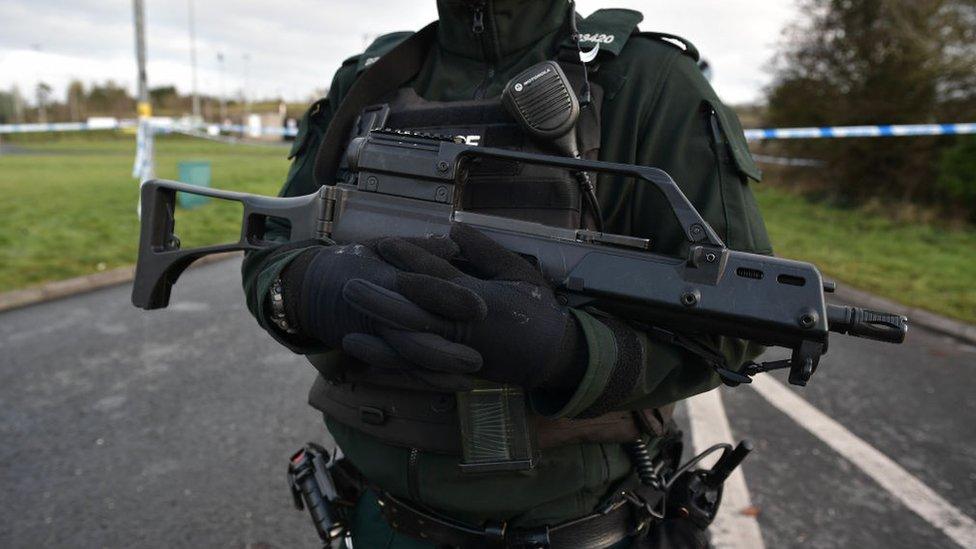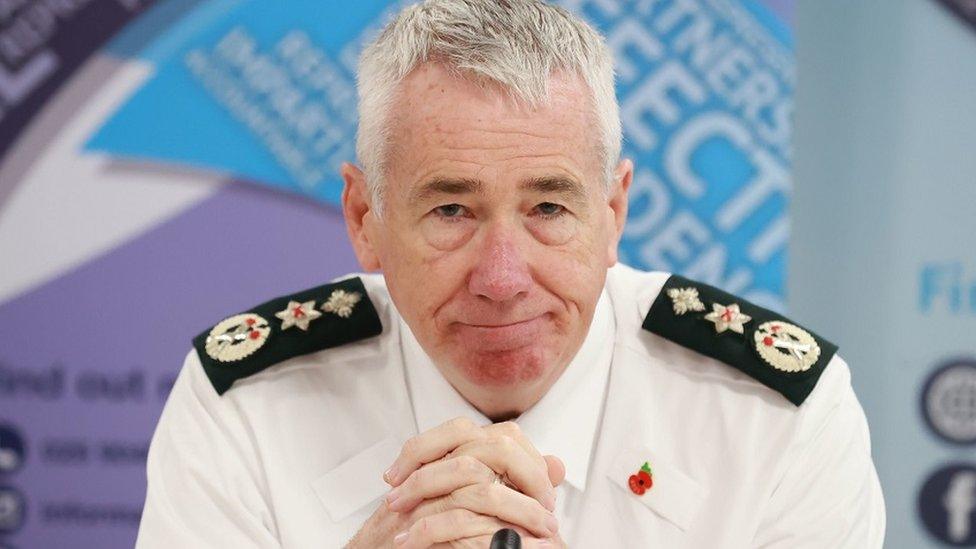NI terrorism threat level reduced to substantial
- Published

The terrorism threat level in Northern Ireland has been reduced from severe to substantial.
It means an attack is likely, as opposed to highly likely, with the decision to change the threat level taken by MI5.
NI Secretary Chris Heaton-Harris announced the decision and said it was a "comprehensive and rigorous process".
He said it was based on the "very latest intelligence and analysis of factors which drive the threat".
"The fact that the threat level is being lowered is testament to the tremendous efforts of the Police Service of Northern Ireland and MI5 to tackle Northern Ireland related terrorism," he added.
"This positive step reflects the commitment of communities from across Northern Ireland to build a safer place to live and work.
"As ever, the public should remain vigilant and report any concerns they may have to the police.
"There remains a small group of people determined to destabilise the political settlement in Northern Ireland through acts of terrorism."

What are the threat levels?
There are five:
CRITICAL means an attack is highly likely in the near future
SEVERE means an attack is highly likely
SUBSTANTIAL means an attack is likely
MODERATE means an attack is possible, but not likely
LOW means an attack is unlikely
Read more: How do terrorism threat levels work?

MI5, rather than the PSNI or the government, is responsible for setting the Northern Ireland terrorism threat level, which it has been publishing since 2010.
MI5, the UK's Security Service, is believed to review the threat level, external every six months.
Threat levels are designed to give an indication of the likelihood of a terrorist attack and there are five rankings ranging from low to critical.


The threat level is back to its lowest point since MI5 first began publishing its assessments in 2010.
It is largely - if not exclusively - an evaluation of dissident republican capabilities, as these groups fit the classification of attacks against the state.
The downgrade might appear subtle and no-one will notice any difference in policing.
It is a general indicator that attacks are more sporadic in nature and that groups like the New IRA presently lack momentum.
However, that is not to say they have lost all ability to carry out shootings or bombings.

The terrorism threat level in Northern Ireland was raised from substantial to severe in March of last year.
That followed a rise in dissident republican activity, including a gun attack on a police officer.
Det Ch Insp John Caldwell was shot several times by two gunmen as he was putting footballs into his car boot having been coaching a youth training session in Omagh, County Tyrone in February 2023.
He has led high-profile inquiries into murders, organised crime and dissident republicans.
Police Service of Northern Ireland (PSNI) chief constable Jon Boutcher welcomed the threat level reduction and said it was "testament to all of our collective long-term efforts, in particular the community, in achieving the kind of society that we all want and deserve".
He said that over recent years the PSNI had "successfully prevented attacks and investigated and pursued groups, such as the New IRA, who don't care about placing our communities at significant risk through their reckless attempts to kill police officers".

PSNI chief constable Jon Boutcher welcomed the terrorism threat level reduction to substantial
"It is sad that there is still a small group of people within our society who are intent on causing harm and dragging Northern Ireland back to the past," he added.
"No-one wants this and we will continue to pursue anyone involved and bring them before the courts in order to make our communities safer."
'Remain vigilant'
Liam Kelly of the Police Federation for Northern Ireland (PFNI) advised officers to remain vigilant despite the reduction of the threat level.
"This revised assessment is welcome news, but it doesn't mean our officers can relax their guard," he said.
"We still have terrorists who want to murder officers and, although there have been significant inroads made against them, they remain a danger to our officers."
- Published28 March 2023
